By Stephen Kalin
BAGHDAD (Reuters) - Islamic State militants in the northern Iraqi city of Mosul are manipulating the exchange rate between U.S. dollars and Iraqi dinars to squeeze money out of local people as coalition bombers attack the group's finances.
The U.S-led coalition has said that in addition to attacking Islamic State's fighters and leaders it will go after financial infrastructure too.
Air strikes have reduced Islamic State's ability to extract, refine and transport oil, a major source of revenue that is already suffering from the fall in world prices. Since October the coalition says it has destroyed at least 10 "cash collection points" estimated to contain hundreds of millions of dollars.
U.S. military officials say reports of Islamic State cutting fighters' wages by up to half are proof that the coalition is putting pressure on the group.
Average pay has been cut from $400 to $200 a month. While wages for foreign fighters, which were between $600 to $800, have also been cut, it is not clear by how much, said U.S. Army Colonel Steve Warren, spokesman for the international coalition.
Yet the militants, who have near total control of the local economy, appear to have adapted to these setbacks in Mosul by introducing a new revenue stream.
The group earns dollars by selling basic commodities produced in factories under its control to local distributors, but pays monthly salaries in dinars to thousands of fighters and public employees, currency traders in Mosul told Reuters.
It earns profits of up to 20 percent under preferential currency rates it imposed last month that strengthen the dollar when exchanged for smaller denominations of dinars, they said.
"Daesh sells (the products) to traders in dollars, but it pays salaries in small denominations of dinars," said an exchange bureau employee in Mosul, using an Arabic acronym to refer to Islamic State.
At the official rate set by the Iraqi government, $100 is currently valued at around 118,000 dinars.
In Mosul, the same amount costs 127,500 dinars when purchased with 25,000-dinar notes, the largest bill in circulation, according to the owner of a currency exchange bureau. The rate rise to 155,000 dinars when purchased with 250-dinar notes - the smallest bill available. Islamic State prefers the larger bills as they are easier to transport.
'NOBODY WOULD RISK IT'
Three other currency traders confirmed those details. They all spoke to Reuters on condition of anonymity for fear of being punished by Islamic State. Security restrictions in areas the group controls prevented Reuters from independently verifying their accounts.
It was not possible to determine how much money Islamic State is making by controlling the currency market. It was also unclear if these practices extended beyond Mosul, the largest city under Islamic State control, to other territories in Iraq and Syria.
Parallel trading at more competitive rates is very limited, traders said, because Islamic State has threatened to confiscate the money of anyone who breaks the rules. If it happens, it is in complete secrecy.
"Nobody would risk it," one of the traders told Reuters.
Islamic State, which is frozen out of traditional financial institutions by international sanctions, operates a cash economy and controls most means of production, including factories producing cement, flour and textiles.
U.S. officials have described it as the world's wealthiest terrorist group. The group looted nearly half a billion dollars from banks in areas it seized in 2014, and besides smuggling oil has derived millions of dollars from taxes and ransoms.
In January, the coalition said air strikes against Islamic State oil facilities had cut the group's oil revenues by about 30 percent since October, when U.S. defence officials estimate the group was earning about $47 million per month.
Iraqi authorities want to retake Mosul this year from Islamic State, which poses the largest threat to the country's security since the U.S.-led invasion in 2003. That is also part of the U.S. strategy for defeating the group.
Warren said air strikes against Islamic State's financial infrastructure were "body blows like a shot to the gut".
"(It) may not knock you out today but over time begins to weaken your knees and cause you to not be able to function the way you'd like to," he told reporters last week.
Eyewitnesses said the latest target was the central bank building in Mosul, destroyed in an air strike this month.

A photo published by Amaq, a news agency that supports Islamic State, showed the collapsed building surrounded by other destroyed structures; no obvious sign remained of its former role in regulating Iraq's financial system.